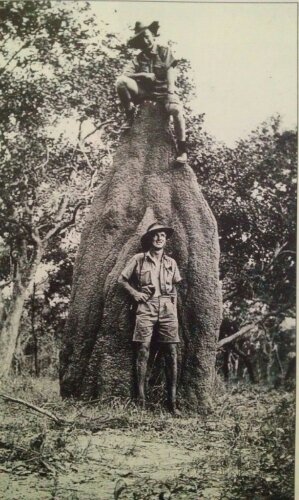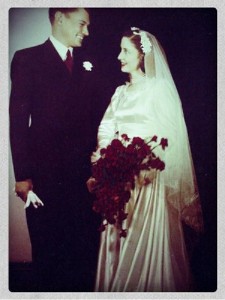
My Grandpa and his mate Leo. Not sure of the exact location. Grandpa describes it as “Leo sat cock-a-hoop on a termites’ nest”
Both my Grandfathers served in the Air Force during World War II.
My maternal Grandpa, Lester John Woodward was a signaller from 1940 – 45 in the South Pacific. He survived many air raids and at one stage a bomb dropped from a plan landed very near him. Luckily, it never went off!
During the war Grandpa was known as Jack. He lived to the grand age of of 90.
In his eighties my Grandpa wrote a book about his experiences in the war. He called it Under it Down Under. The book is full of humour – Grandpa was a true Aussie larrikin.
The preface gives an explanation of the sort of “blokes” he was writing about.
It must be noted that the word “bastard” was a far worse swear word than it is today. It’s original meaning was “born out of wedlock” and it was a usually a terrible insult.
Grandpa might have given me an affectionate rebuke for putting up this post. After all, a true lady never swears. I remember Grandpa apologising profusely if he ever swore around a lady.
He would have forgiven me however because he loved making people laugh. “Get your laughs where you can!” he used to say.
“During the war swearing was used prolifically in a variety of ways but there was a delicacy in the degree of any offensiveness meant.
Swearing was used to relieve depression, to boost morale, to increase good humoured camaraderie and to “let off steam”
A fellow could merit being called a “bloke”, “a good bloke” and a “great bloke”. A quick judgement based on his appearance, demeanour and size of his talk might brand him immediately a “bastard”.
It was regarded as a measure of superb understanding and friendship when fellows could address each other as “you bastard” without either of them taking the slightest offence. A popular friendly greeting was “hello you old bastard,” We all regarded ourselves as “poor bastards”.
Advice may be given – “be careful you don’t make a bastard of yourself!”Orders could be referred to as a “piece of great bastardry” or “get a load of this new bastardry they’re trying to lay on us.”And – “what are those shiny arsed bastard up to now?”
None of this talk was ever used in front of women or in another man’s house; it was strictly for use among those who understood its shades of meaning. New Australians witnessing the greeting of other Australians would stand open mouthed waiting for blows to be struck or knives drawn! It was said Aussie men could call each other the most insulting names and then walk away friends!”
